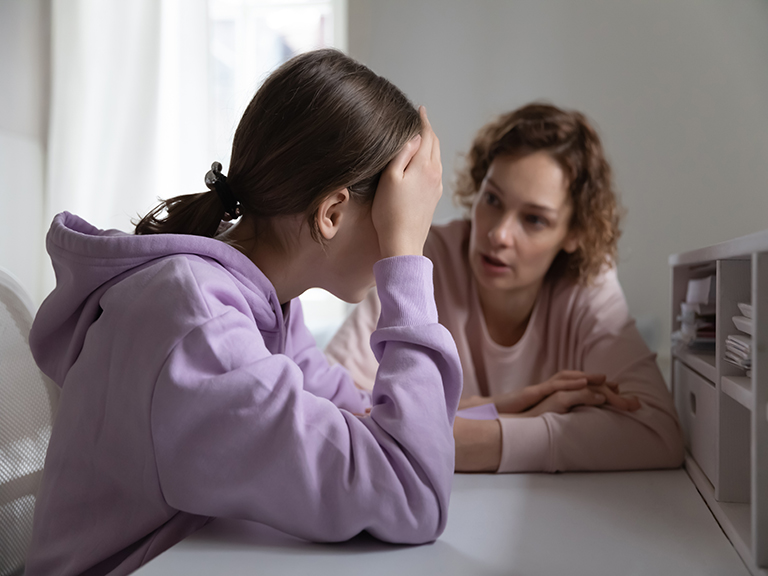- Behavior
- Parenting
How can I reassure my older children about our divorce?

In this article, you’ll find answers to questions like:
1. What will be the biggest concerns?
2. Should I hide my emotions?
3. How might mature children react?
It’s natural to feel daunted about breaking the news to your kids about your divorce, no matter their age. The best approach depends on their maturity, experts say. Below, our local family counselors provide guidance on these life-changing conversations with teens.
1. WHAT WILL BE THE BIGGEST CONCERNS?
Children of all ages benefit from open communication and reassurances from parents who are divorcing. Older children, though, want to ensure their family is still secure and that their parents will remain there for them.
For children in middle and high school, a divorce may not be the surprise that parents envision, says Randy Heller, a licensed marriage/family therapist and adjunct professor at Nova Southeastern University.
“Statistics for divorce are a sobering reality, so chances are good that your pre-teen or teenage child have friends who come from divorced households. Parents should keep the focus on the fact that you aren’t leaving your children; you’re leaving each other,” she says.
Older children may experience insecurity, anxiety and jealousy of new partners if you don’t clearly communicate your continued support and love, says Michelle Rodriguez, interim supervisor for the Positive Parenting Program, known as Triple P, at the Center for Family Services of Palm Beach County.
2. SHOULD I HIDE MY EMOTIONS?
Parents should model the behavior they hope to see, such as respect, compassion and self-control. This is especially important for middle school-aged children as they seek strategies to cope with big emotions. How their parents deal with grief, loss, anger, disappointment and sadness sets an example of how to handle the same emotions.
“Consider a therapist so the child can be heard by a neutral third party,” Rodriguez says. “The therapist may be able to help the parents listen to the child’s feelings and needs so the child doesn’t act out in order to be heard.”
Heller suggests allowing children to witness their parents grieve the loss of the relationship so they know it’s OK to be sad.
“I wouldn’t say an overwhelming amount of sadness and grief, but enough so that they are able to relate,” she says. “If they don’t see sadness, they may feel like they are not allowed to be sad either.”
3. HOW MIGHT MATURE CHILDREN REACT?
Older children may be worried about your ability to take care of yourself, pay bills or cope with loneliness. They may be concerned with the fate of their home as they prepare for work or college, or even resentful that your issues are overshadowing their big milestones. All of that is normal, Heller says, and should be addressed the same way — with open communication and respect.
“I advise parents to get beyond themselves and compartmentalize their emotional needs and that of their children’s,” Heller says. “If you or your kids are struggling, get help, learn how to make the transitions, and learn how to know what your children need.”
Local counseling programs are offered by the Center for Family Services of Palm Beach County and the Center for Child Counseling. If you don’t have insurance, fees are based on a sliding scale.
SOURCES:
• Michelle Rodriguez, Positive Parenting Program interim supervisor, Center for Family Services of Palm Beach County
• Randy Heller, licensed marriage/family therapist; adjunct professor, Nova Southeastern University; board member, Florida Academy of Collaborative Professionals; member, Collaborative Family Law Institute
You May Also Like
-
- Behavior
- Health
- Parenting
BLOG: How can we help our kids struggling with our divorce?
Blog question: My husband and I are getting divorced. Our kids are really upset. One is giving me a lot of attitude, saying it’s all my fault. The other one just cries all the time …
Read More -
- Behavior
- Parenting
How can I help our little ones understand our divorce?
It’s natural to feel daunted about breaking the news to your kids about your divorce. For children younger than 13, it means using words they can understand. Read on for guidance f …
Read More
Related resources
-
- Behavior
- Health
- Other
Mental Health America of the Palm Beaches
Based in West Palm Beach, local information and services related to mental health, including support groups, referrals and an online screening test.
561-832-3755 Website Email -
- Behavior
- Health
- Other
National Alliance on Mental Illness Palm Beach County
Family-to-Family — free 12-session course for caregivers of family members with severe mental illness
561-588-3477 Website Email -
- Behavior
- Health
- Parenting
Center for Child Counseling
Mental health services in Palm Beach Gardens for families, specializing in play therapy for children who've experienced trauma
1-800-480-1899 Website Email -
- Behavior
- Health
- Parenting
Center for Family Services of Palm Beach County
Counseling services and parenting classes
561-616-1222 Website Email -
- Other
- Parenting
Ruth & Norman Rales Jewish Family Services
Center for Families & Children — support services for struggling families, including career assistance, domestic abuse education, financial assistance and special needs outreach
561-852-3333 Website Email
